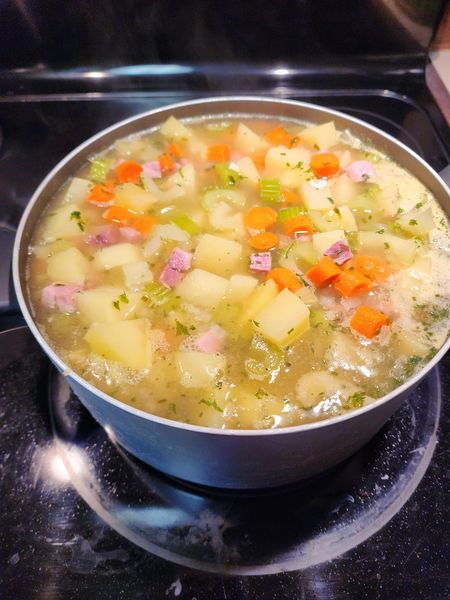- May 15, 2024
Instructions:
- In a large pot or Dutch oven, melt the butter over medium heat.
- Add the chopped onion and minced garlic to the pot. Cook until the onions are translucent and fragrant, about 5 minutes.
- Sprinkle the flour over the onions and garlic, stirring constantly to form a roux. Cook for 2-3 minutes to remove the raw flour taste.
- Slowly pour in the chicken or vegetable broth while stirring constantly to prevent lumps from forming.
- Add the diced potatoes and diced ham to the pot. Stir to combine.
- Season the soup with dried thyme, salt, and pepper. Bring the soup to a simmer and let it cook for about 15-20 minutes, or until the potatoes are tender.
- Once the potatoes are cooked through, stir in the milk or heavy cream. Allow the soup to simmer for an additional 5 minutes.
- Taste and adjust seasoning as needed.
- Serve the soup hot, garnished with optional toppings such as shredded cheese, chopped green onions, or crispy bacon bits.
Enjoy your hearty ham and potato soup!
What is healthy nutrition?
Nutrients are needed in the human body to perform daily functions. Food consumed creates the energy source required for physical activity and biological functions in the body. There are three basic nutrients in the foods we eat. These are carbohydrates, proteins and fats. In addition to these three basic groups called macronutrients, vitamins and minerals, which are micronutrients, are other components taken into the body with food. It is very important to fully meet the needs for vitamins and minerals for the smooth functioning of the digestive, respiratory, excretory, respiratory, circulatory, nervous, skeletal and muscular systems, the healthy production of hormones and body secretions, and the healthy maintenance of motor skills and cognitive functions. has some importance. In addition, maintaining the order of many systems in the body, especially the digestive system, is only possible by implementing a healthy and balanced nutrition plan. Healthy nutrition, in its most basic sense, is a type of nutrition that contains all macro and micronutrients in the amounts a person needs, also fully meets the amount of energy the individual needs, and is suitable for maintaining the ideal weight. Since each individual’s body composition, age, gender and health condition are different, there is no single list that can be defined as a healthy nutrition program. Although the general rules are clear, a healthy nutrition list should be prepared by a dietitian specifically for the individual.
Why is healthy nutrition important?
In order to maintain healthy body functions, protein, carbohydrates, fat, vitamins, minerals and dietary fibers must be taken into the body in sufficient amounts with food. For this, each type of food should be consumed in sufficient quantities and without excess, and diversity should be provided in the diet.
Proteins: Proteins are also called the constructive and restorative food group and are the most abundant nutrient in the structure of the human body. Protein needs must be fully met in order to support psychological and cognitive functions, to perform motor skills and produce the energy required for this, to maintain the healthy production of immune system elements and blood, and to perform many other functions. Protein, which is found in varying amounts in plant and animal foods, increases the amount of protein required for a healthy diet in young people and especially in physically active people and athletes with high levels of physical activity, while the amount of protein required to be taken with food decreases in individuals with a sedentary lifestyle and liver and kidney patients.
Carbohydrates: Carbohydrates are the body’s main energy sources; It is found mostly in grains, legumes and fruits. While individuals who want to eat healthy should take care to fully meet their carbohydrate needs, they should meet them from complex carbohydrates (whole grains, legumes, etc.) with high fiber, vitamin and mineral content, instead of refined sugar and purified grains. In this way, weight control can be achieved, while fluctuations in energy and mood can be prevented and blood sugar can be kept under control.
Fats: Fats, another nutrient, are among the food groups most associated with weight gain and should be consumed in moderation. However, in order to maintain body functions without any problems and especially to maintain hormonal balance, the amount of fat the body needs must be met from healthy sources. Processed oils such as animal fats and margarine should be avoided as much as possible, and instead, care should be taken to consume olive oil and fish containing omega 3 fatty acids. While meeting the fat requirement, this is not just about the fats added to foods; It should not be forgotten that foods such as meat, milk and fish contain significant amounts of fat.










